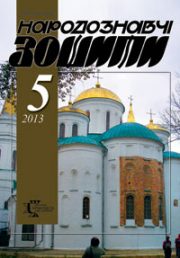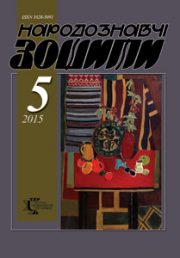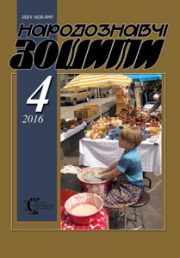The Ethnology Notebooks. 2018, 1 (139), 171–178
UDK 271.4-726.2(477)А.Сапеляк:39:378(477)](093.3)
DOI https://doi.org/10.15407/nz2018.01.171
Received 15.12.2017
ORCID ID: https://orcid.org/0000-0001-8111-6563
Sapeliak Oksana, Candidate of Sciences in History, Senior Researcher
in the department of the modern ethnology
of the Institute of Ethnology of the National Academy of Sciences of Ukraine.
Svobody Avenue 15, 79000, Lviv, Ukraine.
Contacts: e-mail: oksana.sapelyak@gmail.com
Abstract. The analysis of cooperation between Bishop Andrew Sapelyak and the Institute of Ethnology is made. Directions of this cooperation and its importance in the process of study of Ukrainian culture are highlighted.
Keywords: Ukrainian Church, Byzantine-Ukrainian ritual, II Vatican Council, memoir, church figures.
REFERENCES
Sapeliak, A. (1995). Ukrains’ka Tserkva na II Vatykans’komu Sobori. L’viv.
Sapeliak, A. (1999). Kyivs’ka Tserkva na Slov’ians’komu Skhodi. Kanonich-no-ekumenichnyj aspekt. L’viv: Instytut narodoznavstva NAN Ukrainy.
Sapeliak, A. (2016). Mytropolyt Andrej Sheptyts’kyj. Dar Boha Ukraini. L’viv.
Sapeliak, A. (2014). Otets’-prelat Kyrylo Selets’kyj. Zasnovnyk monashykh zghromadzhen’. L’viv.
Sapeliak, A. (2014). Svitlo sviatosti. Otets’ Stepan Chmil’. L’viv.
Sapeliak, A. (2011). Spohady vladyky-misionera. L’viv.
Sapeliak, A. (2013). Try iuvilei Ukrainy z Papoiu Ivanom-Pavlom II. L’viv.
Sapeliak, A. (2006). Ukraina kriz’ viky. Relihijno-tserkovnyj aspekt. L’viv.
Tserkva i suspil’ne pytannia. Mytropolyt Andrej Sheptyts’kyj. Dokumenty i materialy 1899–1944. L’viv, 1998. T. II. Kn. I.






